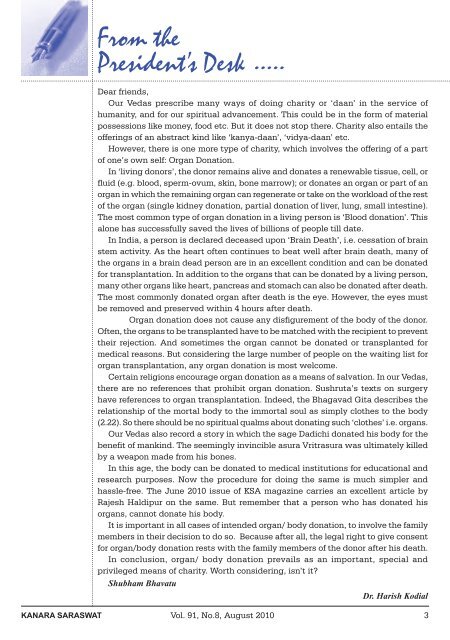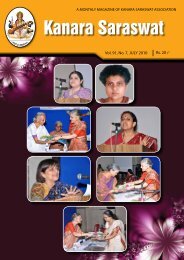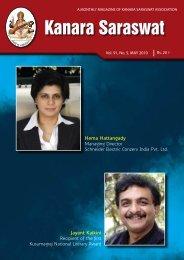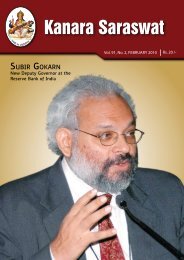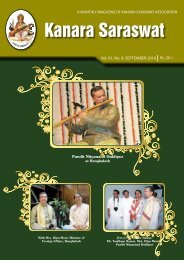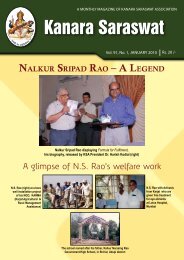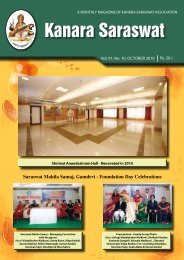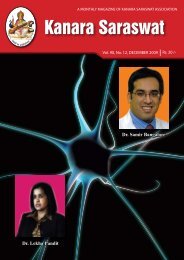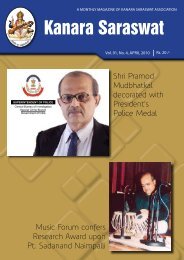You also want an ePaper? Increase the reach of your titles
YUMPU automatically turns print PDFs into web optimized ePapers that Google loves.
From the<br />
President’s Desk .....<br />
Dear friends,<br />
Our Vedas prescribe many ways <strong>of</strong> doing charity or ‘daan’ in the service <strong>of</strong><br />
humanity, and for our spiritual advancement. This could be in the form <strong>of</strong> material<br />
possessions like money, food etc. But it does not stop there. Charity also entails the<br />
<strong>of</strong>ferings <strong>of</strong> an abstract kind like ‘kanya-daan’, ‘vidya-daan’ etc.<br />
However, there is one more type <strong>of</strong> charity, which involves the <strong>of</strong>fering <strong>of</strong> a part<br />
<strong>of</strong> one’s own self: Organ Donation.<br />
In ‘living donors’, the donor remains alive and donates a renewable tissue, cell, or<br />
fluid (e.g. blood, sperm-ovum, skin, bone marrow); or donates an organ or part <strong>of</strong> an<br />
organ in which the remaining organ can regenerate or take on the workload <strong>of</strong> the rest<br />
<strong>of</strong> the organ (single kidney donation, partial donation <strong>of</strong> liver, lung, small intestine).<br />
The most common type <strong>of</strong> organ donation in a living person is ‘Blood donation’. This<br />
alone has successfully saved the lives <strong>of</strong> billions <strong>of</strong> people till date.<br />
In India, a person is declared deceased upon ‘Brain Death’, i.e. cessation <strong>of</strong> brain<br />
stem activity. As the heart <strong>of</strong>ten continues to beat well after brain death, many <strong>of</strong><br />
the organs in a brain dead person are in an excellent condition and can be donated<br />
for transplantation. In addition to the organs that can be donated by a living person,<br />
many other organs like heart, pancreas and stomach can also be donated after death.<br />
The most commonly donated organ after death is the eye. However, the eyes must<br />
be removed and preserved within 4 hours after death.<br />
Organ donation does not cause any disfigurement <strong>of</strong> the body <strong>of</strong> the donor.<br />
Often, the organs to be transplanted have to be matched with the recipient to prevent<br />
their rejection. And sometimes the organ cannot be donated or transplanted for<br />
medical reasons. But considering the large number <strong>of</strong> people on the waiting list for<br />
organ transplantation, any organ donation is most welcome.<br />
Certain religions encourage organ donation as a means <strong>of</strong> salvation. In our Vedas,<br />
there are no references that prohibit organ donation. Sushruta’s texts on surgery<br />
have references to organ transplantation. Indeed, the Bhagavad Gita describes the<br />
relationship <strong>of</strong> the mortal body to the immortal soul as simply clothes to the body<br />
(2.22). So there should be no spiritual qualms about donating such ‘clothes’ i.e. organs.<br />
Our Vedas also record a story in which the sage Dadichi donated his body for the<br />
benefit <strong>of</strong> mankind. The seemingly invincible asura Vritrasura was ultimately killed<br />
by a weapon made from his bones.<br />
In this age, the body can be donated to medical institutions for educational and<br />
research purposes. Now the procedure for doing the same is much simpler and<br />
hassle-free. The June <strong>2010</strong> issue <strong>of</strong> KSA magazine carries an excellent article by<br />
Rajesh Haldipur on the same. But remember that a person who has donated his<br />
organs, cannot donate his body.<br />
It is important in all cases <strong>of</strong> intended organ/ body donation, to involve the family<br />
members in their decision to do so. Because after all, the legal right to give consent<br />
for organ/body donation rests with the family members <strong>of</strong> the donor after his death.<br />
In conclusion, organ/ body donation prevails as an important, special and<br />
privileged means <strong>of</strong> charity. Worth considering, isn’t it?<br />
Shubham Bhavatu<br />
Dr. Harish Kodial<br />
KANARA SARASWAT Vol. 91, No.8, <strong>August</strong> <strong>2010</strong> 3


